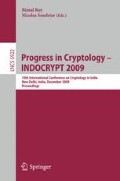Abstract
Consider a device that wants to communicate with another device (for instance a contactless one). We focus on how to withstand privacy threats in such a situation, and we here describe how to query the device and then identify it, with a new identification protocol solution. The interrogation step uses the concept of identification codes introduced by Ahlswede and Dueck. We show that this probabilistic coding scheme indeed protects the device against an eavesdropper who wants to track it. In particular, when using a special class of identification codes due to Moulin and Koetter that are based on Reed-Solomon codes, we directly depend on the hardness of a cryptographic assumption known as the Polynomial Reconstruction problem. We analyse the security and privacy properties of our proposal in the privacy model for contactless devices introduced by Vaudenay at ASIACRYPT 2007. We finally explain how to apply our scheme with very low-cost devices.
This work was partially funded by the ANR T2TIT project.
Access this chapter
Tax calculation will be finalised at checkout
Purchases are for personal use only
Preview
Unable to display preview. Download preview PDF.
References
Ahlswede, R., Dueck, G.: Identification via channels. IEEE Transactions on Information Theory 35(1), 15–29 (1989)
Ar, S., Lipton, R.J., Rubinfeld, R., Sudan, M.: Reconstructing algebraic functions from mixed data. SIAM J. Comput. 28(2), 487–510 (1998)
Bringer, J., Chabanne, H., Icart, T.: Improved Privacy of the Tree-Based Hash Protocols Using Physically Unclonable Function. In: Ostrovsky, R., De Prisco, R., Visconti, I. (eds.) SCN 2008. LNCS, vol. 5229, pp. 77–91. Springer, Heidelberg (2008)
Bringer, J., Chabanne, H., Icart, T.: Efficient Zero-Knowledge Identification Schemes which respect Privacy. In: ACM Symposium on Information, Computer and Communication Security – ASIACCS 2009, Sydney, Australia (March 2009)
Arco, P.D., Scafuro, A., Visconti, I.: Semi-destructive privacy in RFID systems. In: Workshop on RFID Security (2009)
Eswaran, K.: Identification via channels and constant-weight codes, http://www.eecs.berkeley.edu/~ananth/229BSpr05/Reports/KrishEswaran.pdf
Fung, B., Al-Hussaeni, K., Cao, M.: Preserving RFID Data Privacy. In: IEEE International Conference on RFID – RFID 2009, Orlando, Florida, USA (April 2009)
Information Security Group. RFID security & privacy lounge, http://www.avoine.net/rfid/
Guruswami, V., Sudan, M.: Reflections on improved decoding of reed-solomon andalgebraic-geometric codes (2002)
Guruswami, V., Sudan, M.: Improved decoding of reed-solomon and algebraic-geometry codes. IEEE Transactions on Information Theory 45(6), 1757–1767 (1999)
Juels, A., Weis, S.A.: Defining strong privacy for RFID. In: PERCOMW, pp. 342–347. IEEE Computer Society, Los Alamitos (2007)
Kiayias, A., Yung, M.: Polynomial reconstruction based cryptography. In: Vaudenay, S., Youssef, A.M. (eds.) SAC 2001. LNCS, vol. 2259, pp. 129–133. Springer, Heidelberg (2001)
Kiayias, A., Yung, M.: Cryptographic hardness based on the decoding of reed-solomon codes. In: Widmayer, P., Triguero, F., Morales, R., Hennessy, M., Eidenbenz, S., Conejo, R. (eds.) ICALP 2002. LNCS, vol. 2380, pp. 232–243. Springer, Heidelberg (2002)
Kiayias, A., Yung, M.: Cryptographic hardness based on the decoding of reed-solomon codes with applications. In: Electronic Colloquium on Computational Complexity (ECCC), vol. 017 (2002)
Kiayias, A., Yung, M.: Cryptographic hardness based on the decoding of reed-solomon codes. IEEE Transactions on Information Theory 54(6), 2752–2769 (2008)
Kurosawa, K., Yoshida, T.: Strongly universal hashing and identification codes via channels. IEEE Transactions on Information Theory 45(6), 2091–2095 (1999)
Molnar, D., Wagner, D.: Privacy and security in library RFID: issues, practices, and architectures. In: CCS, pp. 210–219. ACM, New York (2004)
Moulin, P., Koetter, R.: A framework for the design of good watermark identification codes. In: Delp III, E.J., Wong, P.W. (eds.) SPIE, vol. 6072, p. 60721H. SPIE, San Jose (2006)
Ng, C.Y., Susilo, W., Mu, Y., Safavi-Naini, R.: RFID privacy models revisited. In: Jajodia, S., López, J. (eds.) ESORICS 2008. LNCS, vol. 5283, pp. 251–266. Springer, Heidelberg (2008)
Ohkubo, M., Suzuki, K., Kinoshita, S.: RFID privacy issues and technical challenges 48(9), 66–71 (2005)
Ouafi, K., Phan, R.C.-W.: Traceable Privacy of Recent Provably-Secure RFID Protocols. In: Bellovin, S.M., Gennaro, R., Keromytis, A.D., Yung, M. (eds.) ACNS 2008. LNCS, vol. 5037, pp. 479–489. Springer, Heidelberg (2008)
Paise, R.-I., Vaudenay, S.: Mutual authentication in RFID: security and privacy. In: Abe, M., Gligor, V.D. (eds.) ASIACCS, pp. 292–299. ACM, New York (2008)
PEARS. Privacy Ensuring Affordable RFID System. European Project
Rieback, M.R.: Security and Privacy of Radio Frequency Identification. PhD thesis, Vrije Universiteit, Amsterdam, The Netherlands (2008)
Rudra, A.: List Decoding and Property Testing of Error Correcting Codes. PhD thesis, University of Washington (2007)
Sadeghi, A.-R., Visconti, I., Wachsmann, C.: User Privacy in Transport Systems Based on RFID E-Tickets. In: Workshop on Privacy in Location-Based Applications – PILBA 2008, Malaga, Spain (October 2008)
Spiekermann, S., Evdokimov, S.: Privacy Enhancing Technologies for RFID - A Critical Investigation of State of the Art Research. In: IEEE Privacy and Security (2009)
Vaudenay, S.: On privacy models for RFID. In: Kurosawa, K. (ed.) ASIACRYPT 2007. LNCS, vol. 4833, pp. 68–87. Springer, Heidelberg (2007)
Verdu, S., Wei, V.K.: Explicit construction of optimal constant-weight codes for identification via channels. IEEE Transactions on Information Theory 39(1), 30–36 (1993)
Weis, S.A., Sarma, S.E., Rivest, R.L., Engels, D.W.: Security and privacy aspects of low-cost radio frequency identification systems. In: Hutter, D., Müller, G., Stephan, W., Ullmann, M. (eds.) Security in Pervasive Computing. LNCS, vol. 2802, pp. 201–212. Springer, Heidelberg (2004)
Author information
Authors and Affiliations
Editor information
Editors and Affiliations
Rights and permissions
Copyright information
© 2009 Springer-Verlag Berlin Heidelberg
About this paper
Cite this paper
Bringer, J., Chabanne, H., Cohen, G., Kindarji, B. (2009). Private Interrogation of Devices via Identification Codes. In: Roy, B., Sendrier, N. (eds) Progress in Cryptology - INDOCRYPT 2009. INDOCRYPT 2009. Lecture Notes in Computer Science, vol 5922. Springer, Berlin, Heidelberg. https://doi.org/10.1007/978-3-642-10628-6_19
Download citation
DOI: https://doi.org/10.1007/978-3-642-10628-6_19
Publisher Name: Springer, Berlin, Heidelberg
Print ISBN: 978-3-642-10627-9
Online ISBN: 978-3-642-10628-6
eBook Packages: Computer ScienceComputer Science (R0)

